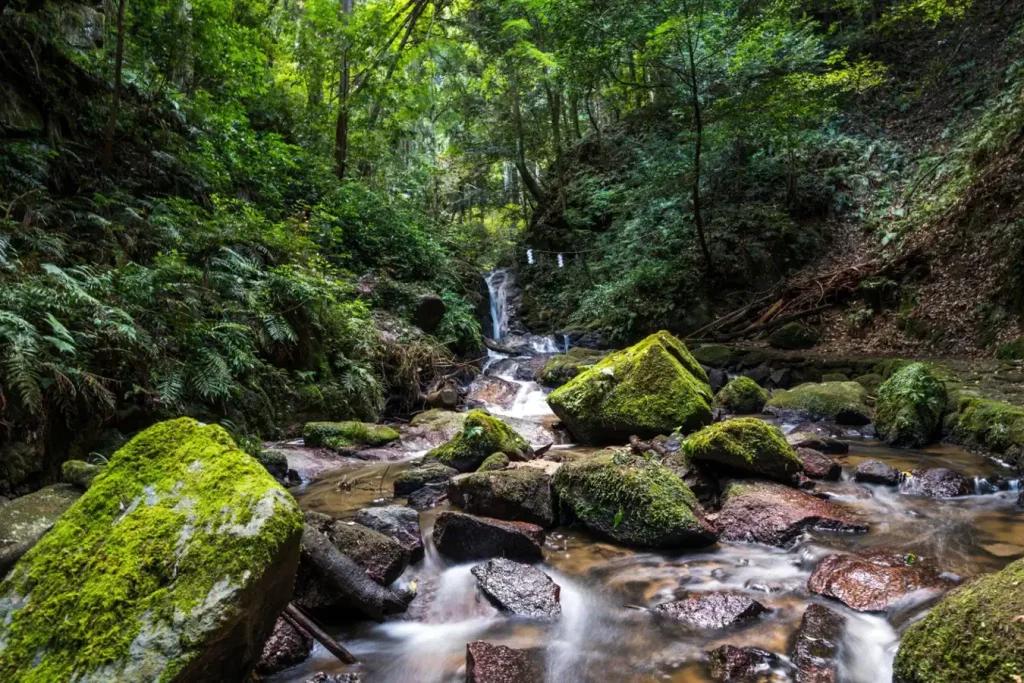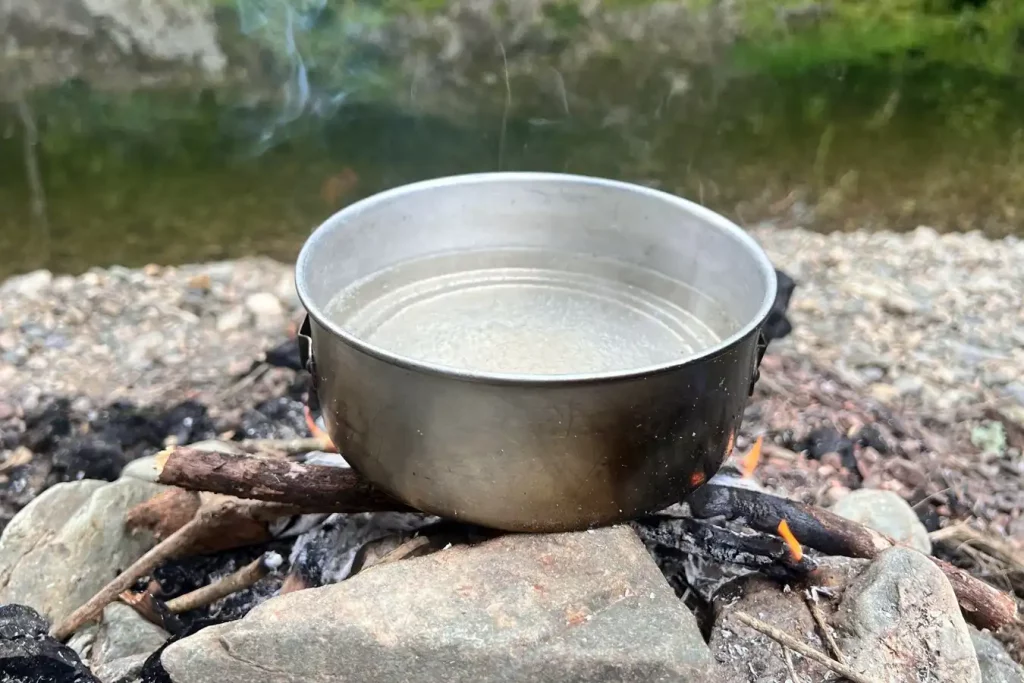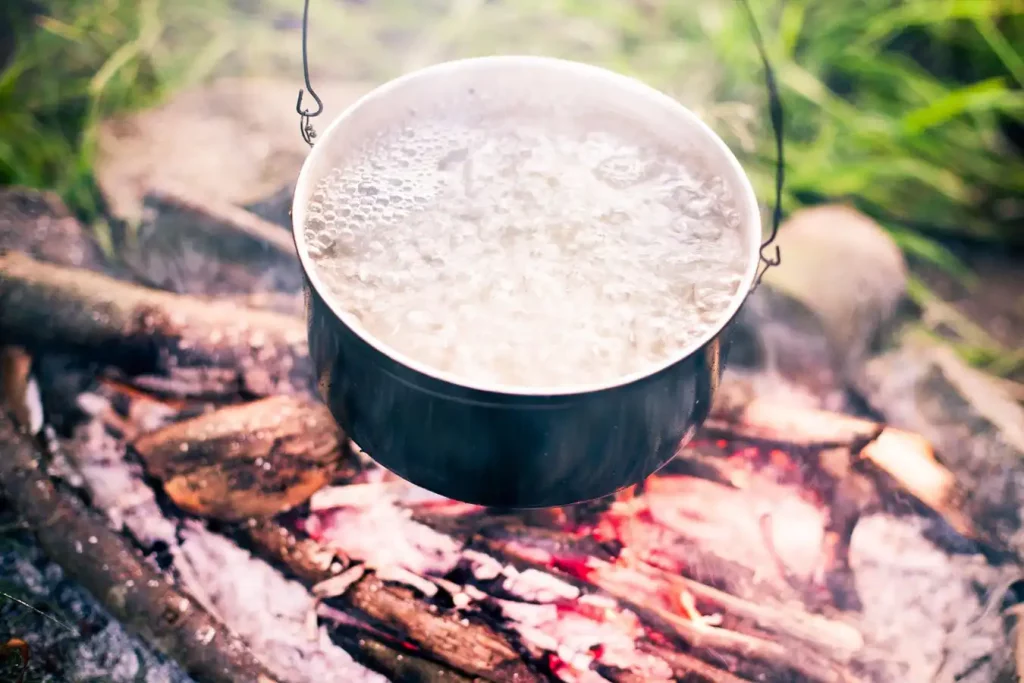Ever wondered about the ins and outs of “how to boil water while camping”?
Turns out, it’s not just about sparking up a fire and hoping for the best!
While the great outdoors offers us freedom, it also brings its own set of quirks when trying to get that kettle whistling.
But hey, whether you’re a camping pro or a newbie, we’ve got the tricks to make your boiling game strong.
C’mon, and let’s make that campfire brew something good!
Why Boil Water?
The idea of drinking straight from a sparkling mountain stream can seem idyllic, almost straight out of a picturesque postcard. However, the reality can be far from it.
The Need for Clean Water
Water, as we all know, is vital for survival. But it’s not just any water; it needs to be clean and safe. Out in the wilderness, sources of water like lakes, rivers, or streams may look crystal clear, but they could contain harmful bacteria, viruses, or parasites. These invisible dangers can cause anything from a minor stomach upset to severe diseases like Giardia or E. coli infections.
So, before quenching your thirst or cooking up that packet of instant noodles, it’s crucial to treat the water you’ve sourced. And the most reliable way to do this is by boiling it.
Risks of Drinking Unboiled Water
Let’s meet Joe, an enthusiastic camper who had a dreadful experience on his last trip. On a beautiful sunny afternoon, Joe, feeling parched, decided to drink water directly from a river without boiling it. “It’s so clear, surely it’s clean,” he thought. Fast forward 24 hours, and Joe was struck with an intense stomach ache and nausea. He had contracted a waterborne disease, turning his adventure into a nightmarish ordeal. To know more about risks of drinking unboiled water.
Drinking unboiled water, even if it appears clean, can expose you to various waterborne pathogens. These pathogens, such as Cryptosporidium or Giardia, are typically resistant to common disinfectants, which is why boiling — a process that kills most types of bacteria, viruses, and parasites — is generally the safest bet.
Learn more: What Number Is Simmer on a Stove
Gathering Water
When camping, understanding how to correctly gather water is as important as knowing how to boil it.
Safe Sources of Water in the Wilderness
When you’re camping, you might find yourself surrounded by various water sources such as streams, rivers, lakes, or even small ponds. However, not all water sources are equal. Flowing water in a stream or river is generally safer than still water found in ponds or lakes, as it’s less likely to contain harmful microorganisms.

But even the fastest flowing river can contain waterborne pathogens. Remember our friend Joe? So, it’s always safer to assume that all open water sources need treatment – in other words, boiling – before consumption.
Know more about what is the best type of water to drink
Proper Water Collection Methods
Proper water collection methods can also help reduce the risk of drinking contaminated water. Always collect water upstream from your campsite to avoid possible contaminants introduced by camp activities. If you’re using a water container, ensure it’s clean to avoid introducing any bacteria into the collected water.
When gathering water, try to choose a spot where the water appears cleanest. Avoid areas with visible algae or floating debris. If the water appears cloudy, let it settle in a container before filtering the clear water off the top.
Read more: What is a Hot Tent Camping
Preparing to Boil Water
Alright, you’ve safely collected your water. Now it’s time to prepare for boiling it.
Necessary Equipment and Tools
The essential tools you’ll need to boil water are a fire source and a container to hold the water. This could be a campfire and a camping pot, a camping stove with a metal mug, or even a portable water heater. If you’re planning to cook, consider a larger pot, while a smaller cup or kettle would suffice for making a hot drink. Remember, your container should be fire-safe and free of any contaminants.
Setting Up a Safe Campfire
When setting up a campfire, ensure it’s away from flammable materials, and remember to keep it contained. Using a fire pit, if available, is ideal. If not, clear an area and encircle it with rocks to create a makeshift fire pit. Always have a method for extinguishing the fire quickly, and never leave it unattended. Safety is paramount when dealing with fire in the great outdoors.
To know more: How to Use Dry Ice for Camping
Methods to Boil Water While Camping
You’ve gathered your water, you’ve prepared your tools, now it’s time to get boiling!
Using a Camping Stove
A camping stove is a great and efficient way to boil water. Simply pour your collected water into your fire-safe container, place it on the stove, and turn it on. Wait until the water reaches a rolling boil and keep it boiling for at least one minute to ensure it’s safe to drink.
Using a Campfire
If you’re using a campfire, place your container with water on a rock or a grill grate in the fire. Allow the water to reach a rolling boil and maintain it for at least one minute. Remember, the container will be hot, so use a cloth or campfire mitt to remove it safely.

Using a Portable Water Heater
A portable water heater is an efficient and easy way to boil water while camping. It operates much like a camping stove – fill the container, turn on the heater, and wait for a rolling boil. Maintain the boil for at least one minute before turning off the heater.
Boiling Water Using Solar Energy
Solar energy can be a potent tool for water purification, particularly in emergency situations when conventional methods might not be available.
Understanding Solar Water Disinfection
Solar water disinfection, also known as SODIS, is a simple yet effective method to purify water using only sunlight and clear plastic or glass containers. It works by using the sun’s UV-A rays and increased temperature to destroy harmful bacteria and viruses. While not technically boiling, it’s an excellent method to purify water when traditional heat sources aren’t available.
Steps for Solar Water Boiling
To use the SODIS method, fill a clear plastic or glass bottle with water, ensure it’s tightly sealed, and then place it in direct sunlight. The process takes approximately 6 hours in strong sunlight, or up to 2 days if the sky is half cloudy. Remember, this method is not effective during extended periods of rain or heavy cloud cover and is less effective with turbid or cloudy water.
However, to boil water while camping, gather water from a safe source, heat it using a camping stove or campfire, and bring the water to a rolling boil for at least one minute to ensure it’s safe for consumption.
After Boiling
Now that we’ve explored the methods of boiling, let’s look at what you should do after the water has been boiled.
Cooling and Storing Boiled Water
Once your water has been boiled, it’s essential to let it cool down naturally. Use caution while handling the hot container and place it in a safe area away from any activity to avoid accidents.
Once cooled, the water should be stored in a clean, closed container to prevent recontamination. Remember, the storage container should be cleaned and dried before use to prevent introducing any bacteria or contaminants to your freshly boiled water.
When and How to Use Boiled Water
Boiled water can be used for a variety of tasks, such as cooking, cleaning dishes, personal hygiene, and, of course, drinking. Essentially, anytime you’d use regular tap water, you can use boiled water while camping.
Alternative Water Purification Methods
While boiling water is generally the most reliable method of water purification, some alternatives can be handy when camping.
Water Purification Tablets
Water purification tablets are lightweight, easy to carry, and effective in eliminating harmful bacteria and viruses. They’re a great backup if you run out of fuel or if boiling isn’t an option. However, they do leave a noticeable taste in the water, which can be off-putting for some.
Portable Water Filters
Portable water filters are an excellent option for campers. They come in various designs, from pump-action filters to squeeze bags, and even straw-style filters. These filters can remove up to 99.99% of waterborne bacteria, making them an incredibly effective alternative to boiling.
Remember, while these methods can purify water, boiling is generally the most reliable way to ensure safe drinking water while camping. But with a mix of these methods, you’ll be well-equipped for your outdoor adventure!
Additional Tips and Warnings
Boiling water while camping is a crucial skill, but there are a few additional pointers and potential pitfalls to keep in mind.
Safety Tips When Boiling Water
Boiling water outdoors comes with its own set of challenges. Here are a few safety tips:
- Distance matters: Always set up your fire or stove a safe distance away from tents and flammable items.
- Watch out for the wind: Wind can fan flames and scatter sparks. So, make sure to position your setup away from the wind direction.
- Use suitable containers: Always use containers that can handle high heat. Plastic containers may warp or melt and metal ones without insulated handles can cause severe burns.
- Handle with care: Use a cloth or tool to handle hot containers and prevent burns.
Common Mistakes to Avoid
Avoiding common pitfalls can make the process of boiling water much smoother and safer. Here are some mistakes to steer clear of:
- Assuming all clear water is safe: Just because water looks clear doesn’t mean it’s safe to drink. Always treat water before consumption.
- Not boiling long enough: Water should be at a rolling boil for at least one minute to kill off any bacteria or parasites.
- Ignoring the container: Not cleaning your container can lead to recontamination of water. Always ensure your water storage containers are clean.
FAQs about Boil Water While Camping
What’s the fastest way to boil water while camping?
How long to boil water when camping?
Does boiling water make it safe to drink camping?
How do you boil water on a camping grill?
Final Thoughts
Boiling water while camping may seem like a simple task, but it’s vital to ensure the safety and health of everyone involved. From understanding why boiling is essential, knowing where to source water, and understanding different boiling methods, we’ve taken an in-depth look at everything you need to know.
The necessity of having access to clean water can’t be understated. Without it, the joy of camping can quickly turn into a challenging ordeal. Always remember that the clarity of water isn’t an indicator of its safety. Boiling is a tried-and-tested method of water purification, and while there are alternatives, they should serve as complements to, not replacements for, boiling.
Embracing these practices will ensure you have a dependable source of clean water on your camping trips, safeguarding your health and enhancing your outdoor adventures. Here’s to many more exciting and safe camping expeditions!
To know more: How Much Water Per Day Camping


